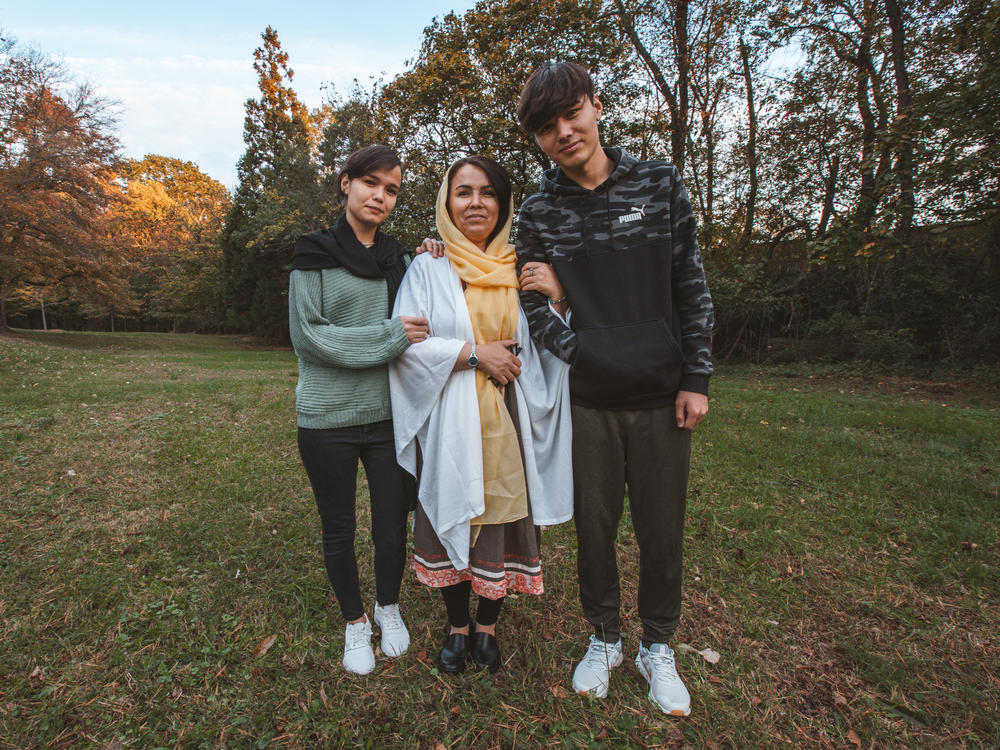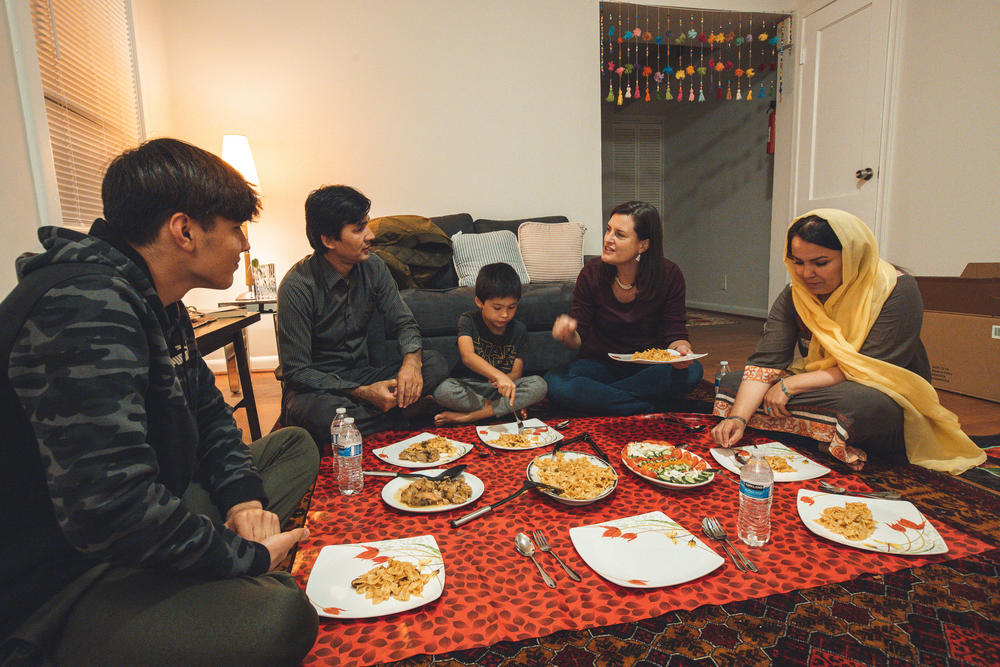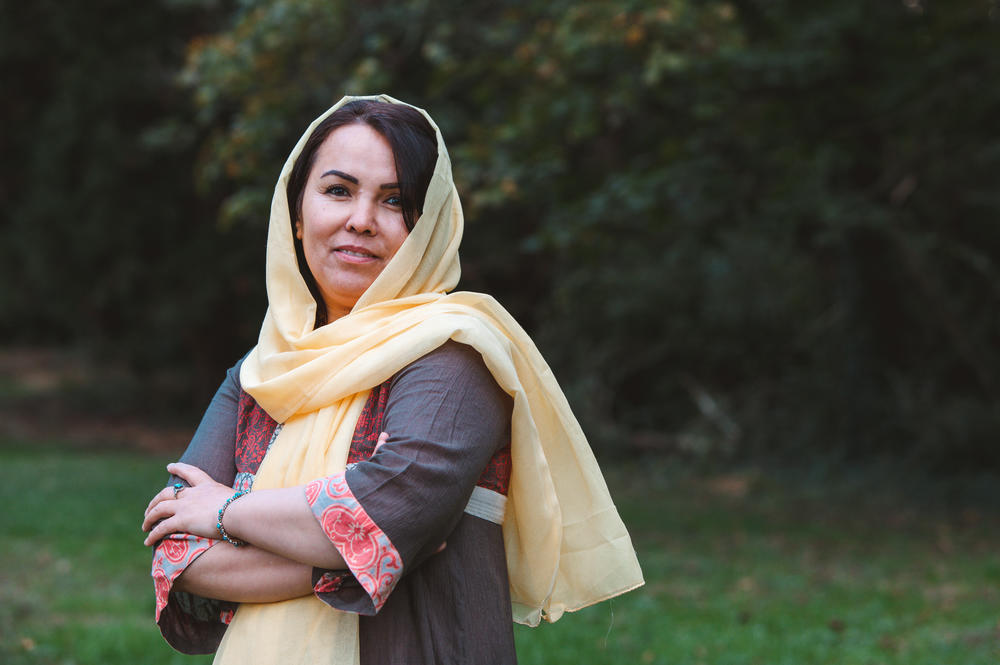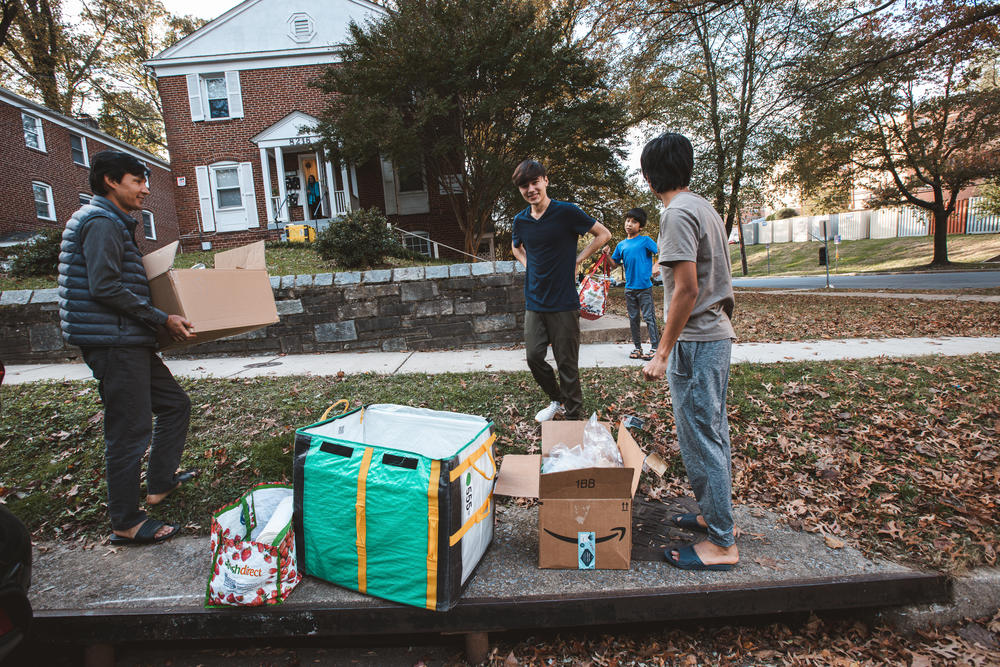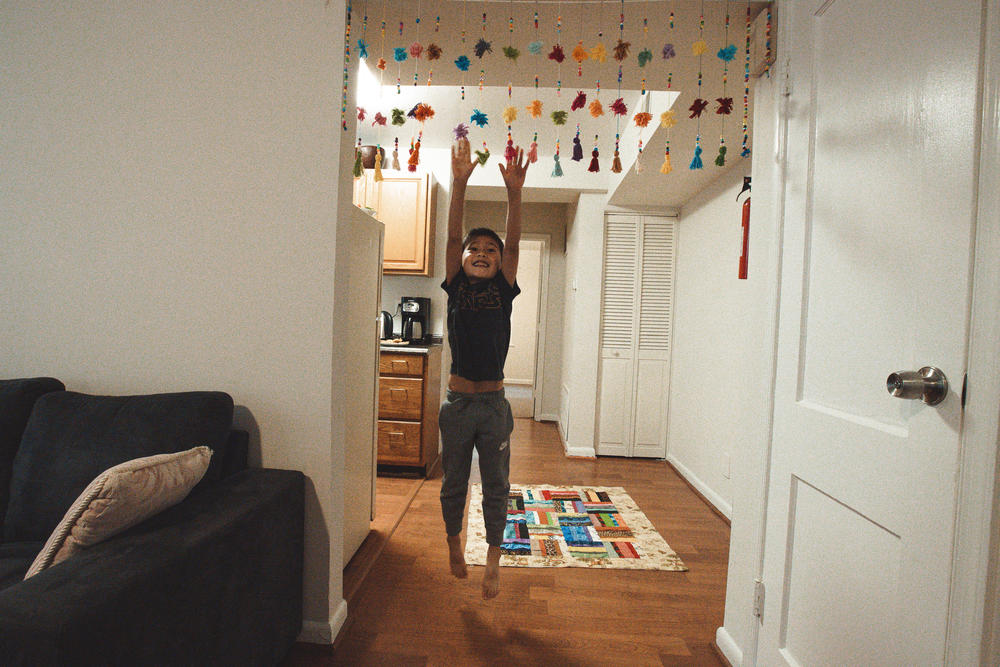Section Branding
Header Content
Newly arrived Afghans get creative and find their own way to homes
Primary Content
The camps at military bases around the U.S. are supposed to be temporary, the last stop for just-arrived Afghan refugees before they move on to permanent homes.
But for many, the weeks are stretching into months, with no clear end in sight.
"They told us you would eventually leave the camp, but it was an uncertain situation," said Zahra Yagana, who spent close to two months at Fort McCoy in western Wisconsin with her two children.
Months after the airlift out of Kabul, roughly 42,000 newly arrived Afghans are still living at seven military bases around the country — including about 8,700 at Fort McCoy alone, according to the Department of Homeland Security.
Refugee resettlement agencies have helped more than 23,000 Afghans resettle in new homes so far, according to DHS. But those efforts have been hampered by a shortage of affordable housing. Several thousand more, including Yagana, have found their own way off the bases.
"There were too many people in the camp, it was difficult to get accustomed to the new conditions," Yagana said in Dari through an interpreter. "The whole environment had gotten me worried a bit."
Yagana, who is 39, said it was a relief to be out of Afghanistan, but life at Fort McCoy was hard. Yagana and her children — Parisa, 21 and Jawed, 18 — slept in a two-story barracks with seven other families. There were people coming and going at all hours, she said, and kids crying around the clock.
It wasn't just the lack of sleep that made Yagana uncomfortable. At least two Afghan men staying at Fort McCoy have been charged with crimes, including assault and engaging in a sexual act with a child.
"It was one of my biggest concerns," Yagana said. "I didn't want us to be in an environment in which we were exposed to bad news every day."
Yagana isn't easily shocked by violence. She was married at 13 to an abusive husband whose drug addiction took up much of the family's income.
"In Afghanistan, many women have the same fate," she said. Yagana divorced her husband, and took her children with her to Kabul, where she started a new life as a writer and human rights advocate. "I wanted to help people do great things," she said.
Compared to her past, Yagana said, whatever happens to her now is no big deal. But she was worried about her kids at Fort McCoy — especially her son Jawed.
"My son was such a sociable person before and had become really quiet. I think the mental side effects of living in the camp are still with him," Yagana said.
Yagana said she wanted to start planning her new life and future in the U.S., but "this was something that I couldn't do in the camp." The chaos on base was too stressful. She knew she had to get her family out.
Yagana said she asked representatives from refugee resettlement agencies at Fort McCoy how much longer her family might be there, but never got a clear answer.
Those resettlement agencies are working to rebuild their capacity on the fly after deep cuts during the Trump administration, when the U.S. refugee program was slashed to the smallest numbers in decades. At the same time, those agencies say they're facing another key bottleneck: a nationwide shortage of affordable housing.
"That still remains the biggest and most pressing issue, because we're struggling finding enough available housing," said Erol Kekic, a senior vice president at Church World Service, one of the nine national organizations contracted by the federal government to resettle refugees.
Kekic says the problem is especially acute in places that already have large Afghan populations, like northern Virginia, and Sacramento, Calif.
Resettlement agencies are increasingly looking to other communities that haven't received as many Afghans in the past, Kekic says. And they're also trying to identify new landlords, who've never rented to refugees before. But that can be a tough sell.
"They have no credit history in the United States, which obviously for many landlords, is a major issue," Kekic told NPR.
Back at Fort McCoy, Zahra Yagana wasn't thinking about the housing market. She was just trying to get her family off the base any way she could.
Yagana went to work. She started reaching out to all of her contacts in the U.S., looking for help. And she found it — from a group of people she had never met.
One of those people is Hossein Mahrammi.
"She contacted me [and said] OK, we are really tired, we want to get out," Mahrammi recalled Yagana telling him on the phone.
Mahrammi knows firsthand how hard it can be to resettle in a new country, even with the help of a resettlement agency. He and his family left Afghanistan in 2017 on a Special Immigrant Visa — a category created by Congress to provide protection to Afghans who worked directly with the U.S. government or contractors in Afghanistan. Mahrammi, his wife and four children settled down in Silver Spring, Maryland, right outside of Washington, D.C.
Mahrammi didn't know Yagana, but a friend who knew about her work in Afghanistan put them in touch. Mahrammi wanted to help. But as a trained economist, he also knew he couldn't foot the bill alone. "I said, let me think and find out if it's possible or not," Mahrammi said in an interview.
Like a lot of Afghans who fled when the Taliban took over in August, Yagana left Kabul without any money and hardly any possessions. She is on a waiting list with a resettlement agency and she is eligible for housing assistance and other benefits when her turn comes.
But Mahrammi knew it could take months for Yagana's benefits to kick in. In the meantime, it would cost thousands of dollars to fly her family from Wisconsin to Maryland, and to cover their rent and security deposit.
Mahrammi says he called everybody in his social circle, and many of them agreed to help financially. Then he called Yagana back.
"'Yes, you can come,'" Mahrammi told her. He bought train and airplane tickets for her family, and organized donations of furniture and houseware. A friend of his set up a GoFundMe page for Yagana's family.
Mahrammi had one other crucial thing he could offer Yagana. He manages the small apartment building where his family has lived since arriving in the U.S. Mahrammi knew there was an empty apartment, and he approached his landlord about renting it to Yagana — even though she had no credit history, and no previous record of any kind in the U.S.
"He knows me. I gained his trust," Mahrammi said. "And he said, as long as you endorse her, I have no problem."
That is how Zahra Yagana rented an apartment in Silver Spring, Md. She proudly showed the apartment off to reporters earlier this month.
"Small room, it's nice room. Very clean," Yagana said in her spare English with a big smile on her face. There's only one bedroom, plus a living room and a small kitchen. The white walls are freshly painted and the living room floor is covered with an Afghan rug.
Yagana says her new home is peaceful and she can sleep well and cook, something she loves to do. As reporters visit, a knock on the door brings in a donation of a new set of plates, cookware, and a 25-pound bag of jasmine rice.
Yagana's daughter Parisa serves green tea. She says she hopes to continue her studies in the U.S. soon.
"In Afghanistan I study in a university. And my major is dentist," Parisa said in halting English. "But when Talibans are coming in Kabul, I can't continue that."
Zahra Yagana isn't sure yet what she will do next, but she too hopes to continue the work she started in Afghanistan. She founded a nonprofit organization, Green Home, that helped provide scholarships and healthcare to children affected by suicide bombings.
But that work made her a target for the Taliban, along with the fact that the family belongs to the minority Hazara Shiite ethnic group, which has historically been persecuted by the Taliban. She was forced to flee the country quickly when Kabul fell.
Now this woman who was used to helping others has to ask strangers for help herself.
"This is not odd for me," Yagana said in Dari. "There were people whom I had never met because they lived in other provinces but I helped them, and I felt I've known them personally although we had never met in person."
At the same time, Yagana said, it seemed strange to ask for help in the U.S., a country where she wasn't familiar with the customs and culture. She wasn't sure it would work. "But there was this trust. I sometimes would tell people a bit about myself hoping that they would help me out," Yagana said. "I believe that there are good people out there."
Copyright 2021 NPR. To see more, visit https://www.npr.org.
